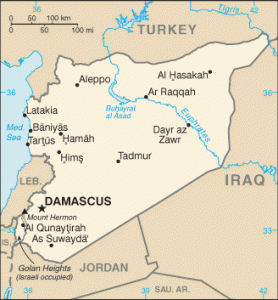.
.
.
Syrian Rebels Accused of Massacring 25 People in Northern Village
The dead and mutilated bodies are dressed as shabiha, the term for pro-Assad militiamen
by John Glaser at antiwar.com
At least 25 people
have been killed and their bodies mutilated by what Syrian state
media described as “terrorists,” as a video was released showing the
bodies piled on top of each other and being described by the cameraman
as a pro-Assad militia.
“These are shabiha of Bashar
al-Assad’s regime,” the narrator said, referring to the opposition’s
name for pro-government armed gangs, and adding that they had been
killed by the rebel Free Syrian Army (FSA) after clashes in northern
Syria.
The SANA state news agency cited sources as saying the victims had
been abducted earlier on Friday from Darat Izza, a village in Aleppo
province. Activists said 26 government supporters had been shot dead by
rebels.
As with most news of massacres from either side, little about the incident can be independently confirmed. But this type of behavior is consistent with earlier findings, like those from the UN, which describe crimes and atrocities being committed by the opposition fighters, including extrajudicial killings and torture.
Still, these are the groups to whom the Obama administration has directed the CIA to funnel money. Covert operatives are reportedly working in neighboring Turkey to coordinate the delivery of arms and heavy artillery to parts of the opposition deemed to be suitable.
But no so-called “vetting process” could ensure the weapons wouldn’t
be used by unscrupulous groups. Even if it could, arming one side in a
virtual civil war would not be a legitimate, or a prudent foreign
policy.
As Joshua Landis, director of the Center for Middle East Studies at
the University of Oklahoma and an expert on Syria, wrote
in Foreign Policy this month, “Let’s be clear: Washington is
pursuing regime change by civil war in Syria. The United States, Europe,
and the Gulf states want regime change, so they are starving the regime
in Damascus and feeding the opposition.”
George Washington University professor and Middle East expert Marc
Lynch has
argued that “arming the Syrian opposition, would likely spread the
violence and increase the numbers of Syrian dead without increasing the
likelihood of regime collapse.” Also,
as we saw in Libya, “fighting groups will rise in political power,
while those who have advocated nonviolence or who advance political
strategies will be marginalized.”
The potential for this meddling to escalate
the violence and exacerbate the suffering is very, very high, and recent
UN investigations suggest the Syrian rebels have committed
atrocities in recent weeks. The humanitarian concerns in Syria are real,
but military intervention does not offer a compelling alternative,
especially since Washington would undoubtedly be getting involved in a
geopolitical game against Iran, as opposed to for humanitarian concerns.
